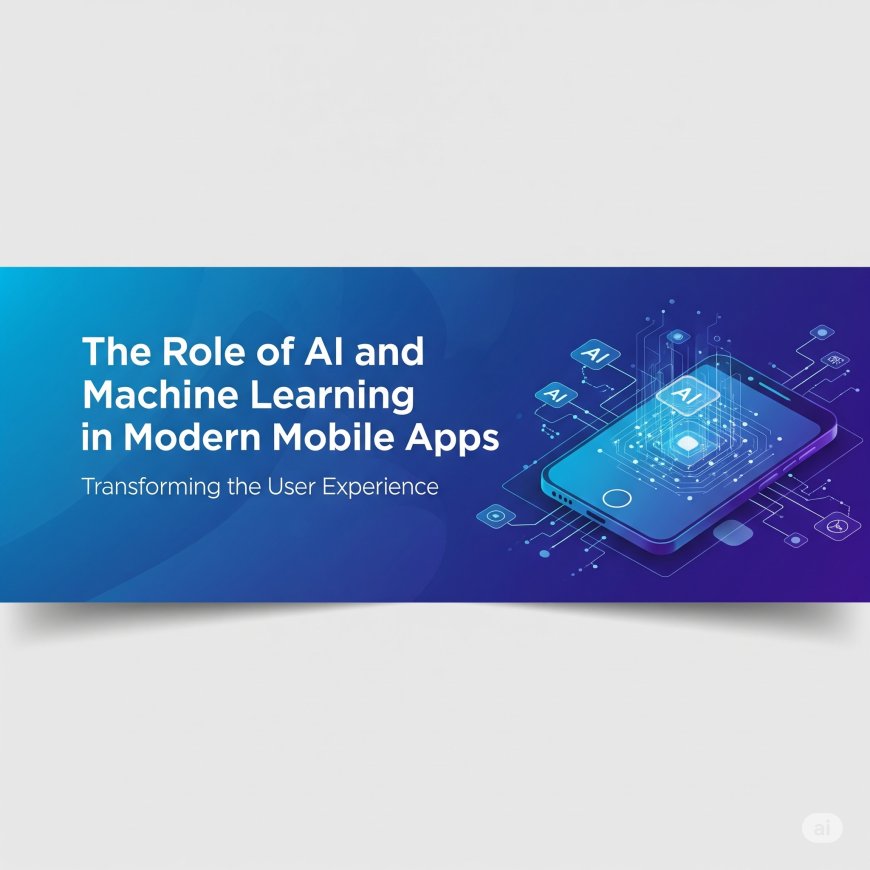The Role of AI and Machine Learning in Modern Mobile Apps
Discover how AI and Machine Learning are transforming mobile apps with smart features like personalization, chatbots, predictive analytics, and real-time security.

In today's most versatile digitalized world, a mobile application serves as more than an instrument to ease our daily activities; it is our smart buddy to facilitate and smoothen them. From intelligent suggestions on your favorite shopping app to voice assistants making it easier for you to manage your tasks, the magic behind these intuitive experiences is AI and Machine Learning (ML).
These technologies are changing today's applications in terms of how mobile app developers create apps, how they interact with users, and how they evolve over time with their users. This blog will go through the how's AI and ML redefine mobile applications of today's age, with a few important use cases and benefits to future possibilities.
What Are AI and Machine Learning?
Artificial Intelligence (AI) refers to the ability of machines to portray human intelligence that is the ability to reason, to solve problems, to comprehend natural language, and to learn from new data. Machine Learning (ML) is a field of study within AI which require training algorithms to identify patterns within data and make decisions or predictions based on it. These systems improve automatically through experience.
AI and ML, therefore, make mobile apps smarter and more adaptive to user requirements.
Key Applications of AI/ML in Mobile Apps
-
Individualization and Advanced Involvement
Artificial Intelligence would exploit the data of the user to develop very probable individualized content and interaction. It can thereby use behavior, preferences, and engagement history to customize the users' app interfaces and its recommendations on a real-time basis.
Examples:
-
Netflix uses ML to analyze people's viewing behavior for new shows or movies recommended for them to watch.
-
Spotify will use complex algorithms to generate playlists like Discover Weekly, Which were formed around each individual's specific listening behaviors.
-
E-commerce applications suggest products based on the habits of their clients' browsing history and past purchases.
This level of personalization takes place in the engagement quotient, retention, and satisfaction levels.
-
Chatbots & Virtual Assistants
Designed for 24/7 self-service assistance, e-commerce chatbots form an integral part of customer support. Supported by AI, these bots interpret user queries and respond accordingly, handle bookings, or manage transactions.
Examples:
-
In-app chatbots available with banking applications can check your balance, transfer money, and allow payment of bills.
-
Travel apps like Expedia provide the option of chat support to straighten out bookings or suggest destination ideas.
-
Google Assistant or Siri from Apple would defer the task to apps best suited for that kind of work.
Chatbots cut down on waiting time, generate higher customer satisfaction, and save operating costs.
-
Voice and Image Recognition
AI can help apps process voice commands and understanding visual data for greater convenience and accessibility for the users.
Examples:
-
Google Lens does image recognition for identifying landmarks, translating texts, and scanning QR codes.
-
Search by voice in YouTube or Google enables hands-free interactions.
-
Face identification in mobile phones (Apple's Face ID, for example) helps secure applications and verify users.
When combined with other would make a richer, more interactive app experience.
-
Predictive Analytics
Models utilized in machine learning learn from historical behavior patterns of their users to predict what actions they might take in the future. For most firms, this feature is especially useful in improving decision-making and delivering the most relevant content at the appropriate time.
Examples:
-
Fitbit and other health apps create sleep profiles and activity targets based on historical data.
-
Financial applications project monthly budgets and spot unusual spending.
-
Ride-hauling services such as Uber anticipate peak hours and adjust prices dynamically depending on demand.
Predictive analytics is thus beneficial to the user experience and allows companies to be proactive.
-
Fraud Detection & Security
The detections of anomalies on the user behavior by the AI systems are to prevent unauthorized access or fraud. These models learn normal user patterns and flag anomalies in real-time.
Examples:
-
AI monitors for suspicious transactions for alerts in banking applications.
-
A secure login by the authentication system is done with biometrics and behavioral characteristics.
-
E-commerce sites report suspicious purchasing trends that could indicate fraud.
Artificial Intelligence strengthens data protection and enhances user trust through continuous learning.
Benefits of AI/ML in Mobile Apps
-
Greater Personalization: Experiences tailored to users keep them engaged.
-
Greater Efficiency: If workflows are automated, less manual intervention is needed.
-
Better Decision-Making: Predictive intelligence empowers users and businesses to make better choices.
-
Lower cost: Operation expenses are reduced due to these chatbots and automated feature processes.
-
Enhanced Security: Any potential data breach is thwarted through real-time threat detection.
The Future of AI & ML in Mobile Apps
With the availability of data and processing power, AI and ML will flourish within mobile applications. Here are some key trends:
-
Hyper personalization using contextual AI
-
Edge AI to process data on the device to provide faster and privacy-aware results
-
AI for AR and VR to promote immersive mobile experiences
-
Emotion AI will assist in adjusting app responses based on how users feel
These changes will ensure mobile apps are more user-friendly, predictable, and seamlessly integrated into user routines.
Final Thoughts
AI and ML are no longer futuristic technologies-they are the engines behind today's smartest apps. By including these capabilities, the developers can bring capabilities in applications that don-t just respond but anticipate, adapt, and evolve. Whether building a shopping app, a fitness tracker, or a digital assistant, AI and ML are the only things that can keep you ahead of the game in a cutthroat mobile ecosystem.
Ready for building a next-gen AI plus app? Let's innovate together.



































